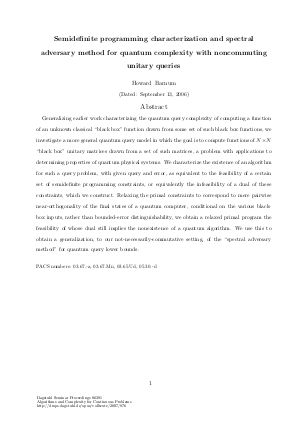Semidefinite programming characterization and spectral adversary method for quantum complexity with noncommuting unitary queries
Author Howard Barnum
-
Part of:
Volume:
Dagstuhl Seminar Proceedings, Volume 6391
Part of: Series: Dagstuhl Seminar Proceedings (DagSemProc) - License:
 Creative Commons Attribution 4.0 International license
Creative Commons Attribution 4.0 International license
- Publication Date: 2007-01-31
File

PDF
DagSemProc.06391.3.pdf
- Filesize: 249 kB
- 25 pages
Document Identifiers
Subject Classification
Keywords
- Quantum query complexity semidefinite programming
Metrics
- Access Statistics
-
Total Accesses (updated on a weekly basis)
0Document
0Metadata
Abstract
Generalizing earlier work characterizing the quantum query complexity of computing a function of an unknown classical ``black box'' function drawn from some set of such black box functions, we investigate a more general quantum query model in which the goal is to compute functions of $N imes N$ ``black box'' unitary matrices drawn from a set of such matrices, a problem with applications to determining properties of quantum physical systems. We characterize the existence of an algorithm for such a query problem, with given query and error, as equivalent to the feasibility of a certain set of semidefinite programming constraints, or equivalently the infeasibility of a dual of these constraints, which we construct. Relaxing the primal constraints to correspond to mere pairwise near-orthogonality of the final states of a quantum computer, conditional on the various black-box inputs, rather than bounded-error distinguishability, we obtain a relaxed primal program the feasibility of whose dual still implies the nonexistence of a quantum algorithm. We use this to obtain a generalization, to our not-necessarily-commutative setting, of the ``spectral adversary method'' for quantum query lower bounds.
Cite As Get BibTex
Howard Barnum. Semidefinite programming characterization and spectral adversary method for quantum complexity with noncommuting unitary queries. In Algorithms and Complexity for Continuous Problems. Dagstuhl Seminar Proceedings, Volume 6391, pp. 1-25, Schloss Dagstuhl – Leibniz-Zentrum für Informatik (2007)
https://doi.org/10.4230/DagSemProc.06391.3
BibTex
@InProceedings{barnum:DagSemProc.06391.3,
author = {Barnum, Howard},
title = {{Semidefinite programming characterization and spectral adversary method for quantum complexity with noncommuting unitary queries}},
booktitle = {Algorithms and Complexity for Continuous Problems},
pages = {1--25},
series = {Dagstuhl Seminar Proceedings (DagSemProc)},
ISSN = {1862-4405},
year = {2007},
volume = {6391},
editor = {Stephan Dahlke and Klaus Ritter and Ian H. Sloan and Joseph F. Traub},
publisher = {Schloss Dagstuhl -- Leibniz-Zentrum f{\"u}r Informatik},
address = {Dagstuhl, Germany},
URL = {https://drops.dagstuhl.de/entities/document/10.4230/DagSemProc.06391.3},
URN = {urn:nbn:de:0030-drops-8769},
doi = {10.4230/DagSemProc.06391.3},
annote = {Keywords: Quantum query complexity semidefinite programming}
}
